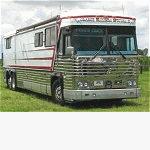| Author | Message | ||
| Larry Nelson (Larryn4106)
Registered Member Username: Larryn4106 Post Number: 6 Registered: 8-2008 Posted From: 173.22.183.74 Rating: N/A |
Can anyone tell me just what that means. I have a Diesel Exchange engine in my 4106, about 20,000 miles on it in 4 years. There hasn't been a wrench on it since, just oil changes. Is a "tune up" something I should be thinking about? | ||
| Jack Conrad (Jackconrad)
Registered Member Username: Jackconrad Post Number: 968 Registered: 12-2000 Posted From: 71.54.29.215  Rating: N/A |
The "Rack" controls how much the injector opens (amount of fuel injected into the engine). As parts wear, they came become out of adjustment. "Running the rack" involves adjusting the rack so that each injector opens exactly the same amount for any given throttle setting. Not sure how often this should be done, a fellow busnut told me yesterday that thought it was supposed to be done every 50,000 miles. Jack (Message edited by JackConrad on February 20, 2009) | ||
| R.C.Bishop (Chuckllb)
Registered Member Username: Chuckllb Post Number: 505 Registered: 7-2006 Posted From: 75.208.238.82 Rating: N/A |
Curiosity.... is that only on DDs or on any fuel injected engine? Autos as well?.... Thanx RCB | ||
| Luvrbus (Luvrbus)
Registered Member Username: Luvrbus Post Number: 645 Registered: 8-2006 Posted From: 74.32.92.133 Rating: N/A |
Larry, the emmission 2 stroke engines require tuneups every 50,000 but the older engines don't need it, but yours being a rebuild 4 years ago I would run the rack and set the valves because there is always some wear on rebuilt engines during the first couple of years good luck (Message edited by luvrbus on February 20, 2009) | ||
| marvin pack (Gomer)
Registered Member Username: Gomer Post Number: 404 Registered: 3-2007 Posted From: 71.55.228.218  Rating: N/A |
RC' I don't think that these newer diesels use tha ole DD method. but Have you come up beside some of these Fords that sound like a thrashing machine> I would definately do something to them. Not picking on Fords but they sound the worst of all and smoke like a Georgia freight train. Dodges blow some kinda smoke out but all in all the fords are worse. My opion only, not associated with any group of shister mechanics, I love my DD Long Live DD's. Gomer | ||
| R.C.Bishop (Chuckllb)
Registered Member Username: Chuckllb Post Number: 506 Registered: 7-2006 Posted From: 75.208.148.9 Rating: N/A |
Verrrry interesting....  So, I have a Cummins 220 turbo....probably 75,000 on the rebuild..... And...should I ....or??? Is this a ...uhh, ...ahem..."do it yourself" thing?...or $$$.    Thanx, RCB | ||
| Tom Christman (Tchristman)
Registered Member Username: Tchristman Post Number: 64 Registered: 1-2006 Posted From: 66.218.33.156 Rating: |
To better explain "running the rack" Detroit 2 stroke mechanically injected engines have unit fuel injectors. This means that each cylinder has its' own injector pump that is fed by low pressure fuel with a fuel return, powered by a third lobe on the camshaft through a rocker arm and push rod, and has a throttle control (a small rod that pushes in and out of the injector). To tie the 3, 4 or 6 cylinder heads together in an individual head, there is a rack that goes the length of the head with a common rod with individual pivots for each cylinder. This rack is then connected to the governor for speed control. Periodically it is necessary to adjust the rack to make sure the injectors are all balanced as to opening fully at the same time, the injector height is correct, the clearance on the rocker arm for the injector is correct, and that the exhaust valves have the proper clearance also, so they don't burn if they get to tight. When I was running my 8V-92TA mechanically injected engine in my truck, I had it tuned, or run the rack every 100,000mi. For our type of use, the for mentioned 50,000mi is a better figure. If you have a DDEC engine, you will not have a rack to run, but still have to adjust the clearance on the injector and exhaust valves. Once you adjust the exhaust valves, if you have a Jake brake, you'll then have to adjust the Jake also. Good Luck, TomC | ||
| FAST FRED (Fast_fred)
Registered Member Username: Fast_fred Post Number: 700 Registered: 10-2006 Posted From: 69.19.14.40 Rating: N/A |
I don't think that these newer diesels use tha ole DD method. Some new large marine diesels use a modified version . A "DD " like rocker powered pump will be used to preassurize a small fuel manifold , and the high pressure (30,000psi) fuel is then injected by a 3 stage electronic controlled injector . Less chance of stopping with many high pressure pumps than with a 30,000psi (or more) fuel rail and a single pump. FF | ||
| Skip N (Skip)
Registered Member Username: Skip Post Number: 38 Registered: 11-2006 Posted From: 97.73.64.173  Rating: N/A |
"Curiosity.... is that only on DDs or on any fuel injected engine? Autos as well" There is basically 3 styles of mechanical diesel injection. Common rail type like DD scroll pump like CAT,case,some John Deer etc CAV/Roostra(sp) like some John Deer, Perkins etc Scroll pumps have a rack that rotates the scrolls and usually doesn't need re-adjustment once adjusted and set. Hope this helps Skip (Message edited by skip on February 21, 2009) |